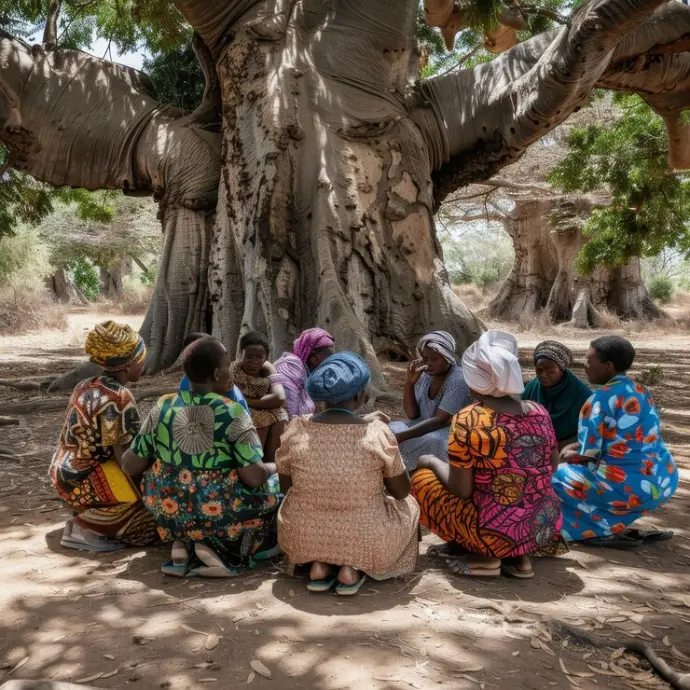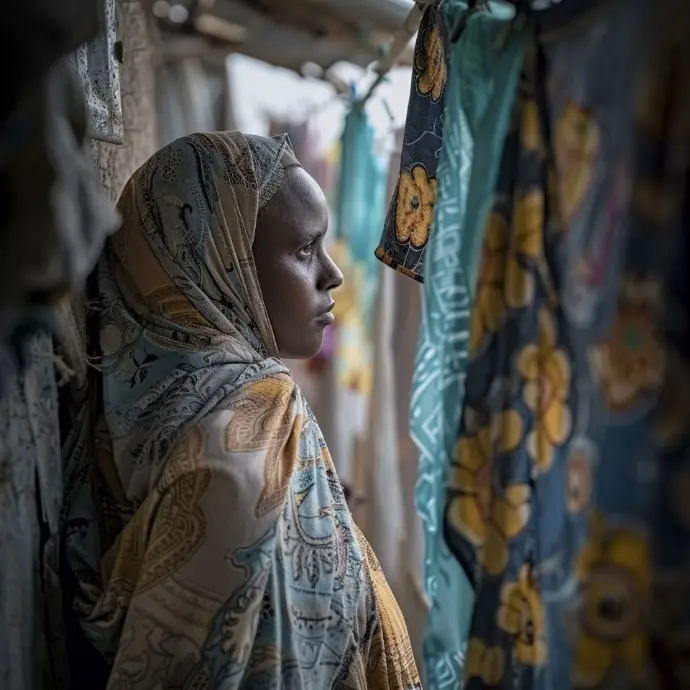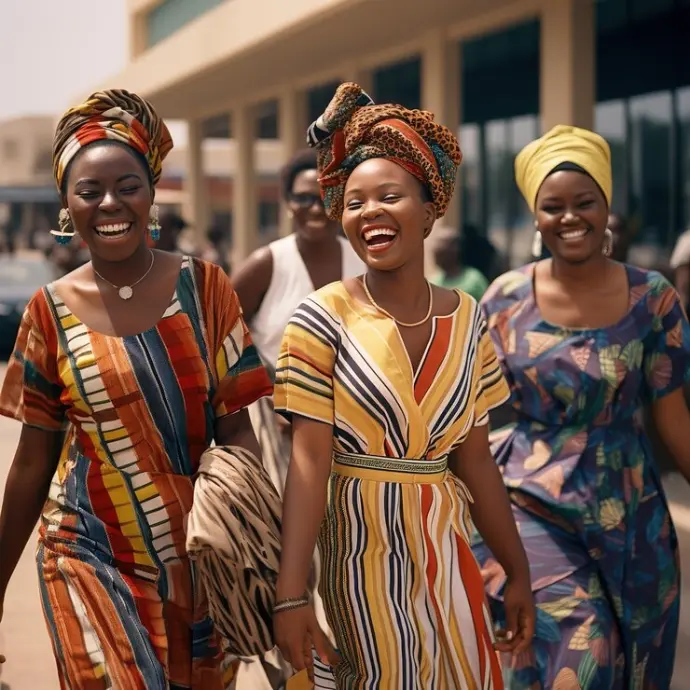African Feminism:
A Call to Action Against Gender Oppression
Embark on a fascinating journey through the civilizations of the African continent, exploring their beginnings, their influence on the world, and their most intriguing stories. In our feature article, “African Feminism: A Call to Action Against Gender Oppression,” you will have the opportunity to learn about the powerful feminist movement in Africa and its fight against gender oppression. Are you ready to discover the cultural richness and tenacity of African women? Don't miss it!

Introduction to African Feminism: Roots and Development
African feminism is a movement that has evolved over time, grounded in the struggles for gender equality and social justice on the continent. Unlike Western feminist movements, African feminism is born from the unique experiences and realities of women in Africa, addressing not only gender oppression but also issues such as racism, colonialism, and economic inequality. This movement in Africa originated in the struggles against colonialism and racism, where women played a crucial role in resistance and in the formation of free African nations. Over time, as African societies have changed, African feminism has adapted to new political, social, and economic contexts, advocating for female autonomy, equal rights, and the elimination of gender discrimination.
African feminism is not limited to seeking gender equality; it also challenges cultural and traditional norms that continue the oppression of women in various African settings. Through resistance, community organizing, and political involvement, feminists in Africa have worked hard to change power structures and build more just and inclusive societies for all.
Feminism in Africa originates in African women's aspirations for freedom and equality since ancient times. Throughout history, women in Africa have challenged patriarchal norms and led resistance movements against gender oppression. From the queens and matriarchal leaders of various African nations to today's activists, African feminism has represented a powerful facet in the fight for equality and justice.
The battles for autonomy of African nations during the 20th century were fundamental to the development of African feminism as both a political and social movement. African women played an important role in the struggles against colonialism, demanding not only the liberation of their countries but also the emancipation of their lives from oppression and inequality. This historical moment paved the way for the emergence of feminist leaders who promoted gender equality and social justice on the African continent.
Over the decades, African feminism has evolved, adapting to social and political transformations in Africa. From the African Women's Conference in 1977 to current feminist mobilizations, the movement has grown in reach and impact, challenging patriarchal structures and fighting for a more just and equitable future for all people living in Africa.
African Feminism in the Fight Against Gender Oppression
Gender oppression in Africa refers to the multiple ways in which women and non-binary people suffer from inequality, discrimination, and violence on the continent. This form of oppression manifests itself in various aspects of life, including education, employment, politics, health, and social participation. Throughout history, women in Africa have been excluded and treated as inferior within patriarchal systems that limit their freedom and possibilities.
Gender oppression in Africa is also based on cultural norms and traditions that reinforce strict and harmful gender roles. These norms often impose limitations on women, restricting their freedom and hindering their decision-making about their own lives. Gender oppression in the African context not only harms individual women but also negatively impacts the development and advancement of societies as a whole. To effectively combat gender oppression in Africa, it is crucial to recognize and challenge the structures and systems that maintain inequality and discrimination. African feminism presents itself as a strong movement that seeks not only to achieve gender equality but also to change the social and cultural structures that sustain gender oppression on the continent.
Currently, Africa faces serious problems related to gender oppression. One of the most obvious examples is the lack of equal access to education for girls and women in many regions of the continent. Economic, cultural, and social barriers often prevent African women from obtaining quality education, which limits their opportunities for personal and professional growth.
Another notable case of gender oppression in Africa is the high rate of gender-based violence, which includes domestic violence, female genital mutilation, child marriage, and human trafficking for sexual exploitation. These forms of violence affect women and girls throughout the region, seriously impacting their physical, emotional, and psychological well-being.
Furthermore, women's political involvement and presence in decision-making positions in Africa are still limited, highlighting the structural difficulties women face in their struggle for equality and justice. Feminism in Africa has emerged as a driving force to confront these inequalities and strive for a more just and equitable future for all inhabitants of the continent.
Main Challenges of African Feminism
One of the main challenges facing feminism in Africa is the continuation of cultural conflicts deeply rooted in patriarchal patterns. In many African communities, norms and traditions have maintained gender inequality and the oppression of women for generations. These cultural systems often relegate women to secondary positions, limiting their ability to participate in decision-making and restricting their access to education and economic opportunities.
The challenge is to challenge and change these deeply established cultural structures that cause gender oppression. African feminism seeks to question traditional norms, challenge established gender roles, and promote equal opportunities for women and men in all aspects of society.
Addressing these cultural conflicts and patriarchal traditions is essential to moving toward a more equitable and just African society, where women have sufficient voice, power, and autonomy to fully participate in all spheres of social, political, and economic life.
Another important challenge for African feminism is the impact of poverty and lack of access to education on the fight against gender oppression. In many African communities, extreme poverty limits women's development opportunities, hindering their access to education, healthcare, and decent jobs.
The lack of access to education is especially detrimental to women, depriving them of the tools they need to empower themselves, make informed decisions, and challenge existing power structures. Education is vital to breaking the cycle of poverty and ensuring that African women can reach their full potential and make meaningful contributions to the development of their communities.
African feminism fights for equal access to education for women and girls, in addition to promoting the implementation of policies and programs that address the underlying causes of poverty and foster women's economic empowerment throughout Africa.

Strategies and Actions of African Feminism Against Oppression
Feminism in Africa has emerged as an impactful and diverse movement that seeks to confront the various forms of gender rights violations present in African societies. One of the main tactics to combat this violation is education. The importance of education in women's liberation is essential in the battle against gender inequality on the African continent.
Education is vital to the liberation of African women, as it provides them with the necessary tools to challenge unjust gender norms and access opportunities that have historically been denied to them. Through education, women in Africa can empower themselves, improve their skills and abilities, and challenge gender stereotypes prevalent in society.
Furthermore, education is crucial for raising awareness about gender issues and promoting equality in all sectors of society. By ensuring quality and accessible education for African women, we help create a more just and equal society for all its members.
In the battle against gender inequality, activism and mobilizations have proven effective in raising awareness, driving change, and achieving significant progress in the pursuit of gender equality in Africa. Across the continent, there have been successful examples where feminist activism has achieved real change and encouraged other women to join the cause.
From street demonstrations to initiatives on digital platforms, feminist activism in Africa has successfully highlighted gender injustices, challenged patriarchal structures, and promoted gender equality in different areas of society. Examples such as the #MeToo movement in Nigeria, the fight to eliminate female genital mutilation in Kenya, or the campaign for equal access to education for girls in Malawi are just a few examples of the positive impact of feminist activism on the continent.
These successful examples demonstrate the importance of mobilization and activism in the fight against gender inequality in Africa, as well as the need to continue working together to build more just and equitable societies for all people, regardless of their gender.

Global Influences and International Solidarity in African Feminism
African feminism consists of a diverse movement that seeks to examine how gender, race, social class, and other aspects of identity intersect. Intersectionality within African feminism understands that the experiences of oppression faced by women in Africa are linked to various forms of discrimination and inequality. This holistic approach helps us see how elements such as the colonial past, the global economy, and patriarchal structures affect women on the continent differently.
Intersectionality within African feminism highlights the need to address gender oppression within a broader framework, taking into account the complex power dynamics that impact the lives of African women. By recognizing the connections between gender and other forms of discrimination, we foster a more inclusive and effective feminist movement, aiming to change the social and political structures that maintain inequality. Likewise, intersectionality in African feminism promotes unity among women from different countries and continents, fostering international collaboration to jointly address the common challenges facing women around the world. This transnational solidarity strengthens African feminism by linking it with other feminist struggles worldwide, enriching strategies and actions to confront gender oppression in all its forms.
International cooperation in African feminism is reflected through networks, associations, and movements that bring together women from various nations in their struggle against gender oppression. Groups such as the African Women's Network and the African Women's Coalition for Peace and Human Rights are examples of initiatives that support solidarity and collaborative work among African women of different origins.
Additionally, events such as the Women's March around the world and the African Women's Summit are venues where the demands and struggles of African women are made visible internationally, raising awareness about the realities and problems they face in their communities. These platforms provide an opportunity for the voices of African women to be heard globally, strengthening the impact of African feminism on the global human rights and gender equality agenda.
Intersectionality and international cooperation are essential foundations of African feminism, which seeks to change power structures and promote gender equality in a global context of solidarity and justice.
The Future of Feminism in Africa and the Fight Against Gender Inequality
Within the realm of feminism in Africa, one of the most notable challenges is the continuation of certain customs and traditions that maintain gender inequality. Despite the progress made in the pursuit of equality, many women in Africa still experience discrimination in various areas of their lives, such as education, political participation, and community decision-making.
To eliminate gender oppression in Africa, it is essential to address the patriarchal structures deeply rooted in the culture. This requires the development of laws and policies that support women's rights and the promotion of women's active participation in all areas of life, such as the economy, education, and politics.
Regarding what the future holds for African feminism, it is vital to continue strengthening unity among African women and adopting an approach that recognizes the various forms of discrimination that affect women on the continent. Furthermore, it is important to continue giving visibility to the experiences and struggles of African women, both locally and internationally, to raise awareness and mobilize concrete actions for gender equality.
Awareness-raising and continuing education are key to promoting feminism in Africa and combating gender inequality on the continent. It is necessary to develop educational programs that critically examine gender norms from an early age and promote equality between men and women.
Likewise, it is essential to create spaces where African women can share their experiences, exchange ideas, and strengthen their empowerment. Continuing education on women's rights and tactics to confront gender oppression is crucial to achieving lasting change in African society.
In this context, African feminist organizations play a vital role in educating and raising awareness among the population on gender issues, and in promoting justice and equality for all women on the continent. Her work contributes to creating a more just society free from gender discrimination in Africa.
Conclusion: African Feminism as an Engine of Change
African feminism has established itself as a strong and diverse movement that seeks to challenge and change the structures of gender oppression present in society. Through resistance, education, and collective action, women in Africa have spearheaded efforts to promote gender equality, justice, and women's empowerment, both within their communities and more broadly.
This call to action against gender oppression has not only raised awareness of the injustices suffered by African women but has also led to significant changes in public policies, laws, and social norms in various nations across the continent. African feminism has successfully made the experiences and struggles of African women visible, challenging stereotypes and forming an inclusive and supportive movement that promotes diversity and equality.
It is crucial to understand the intersectionality of African feminist struggles, which not only confront gender oppression but also relate to other forms of discrimination and inequality, such as racial, economic, and colonialism. African feminism encompasses not only women's freedom but also seeks to change the social and political structures that maintain inequality and injustice on the continent.

 IHRO NEWS
IHRO NEWS